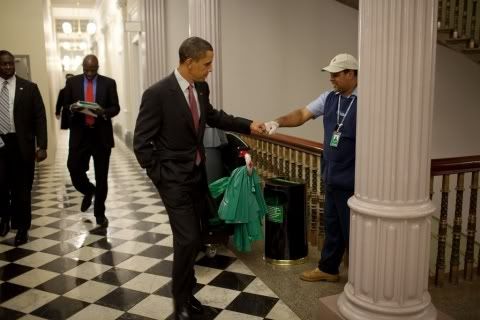Sometimes I think about what goes into a decision about whether or not to support a political candidate. It seems to me that many of us argue about this without ever acknowledging all the factors that go into that decision. The fact is that people prioritize these factors differently, but that is rarely taken into consideration.
Since Barack Obama was elected president, his critics on both the left and right often accuse his defenders of engaging in blind support of him no matter what he does. They call us Obamabots. I'd like to suggest that is because they think we support the President solely based on his position on issues. I'm here to say that's not the case for me.
There is a lot of truth in the old adage: If two people agree on everything, one of them is unnecessary. That's what allows Democrats to consider FDR one of our greatest presidents, even though he is responsible for the Japanese internment camps. Its also why I never wavered in my support of Paul Wellstone - even when he voted for the Defense of Marriage Act.
But beyond an acceptance of the fact there there is never going to be a candidate who aligns with me perfectly on every issue, there's something else that comes into play in my decision about whether or not to support a candidate/politician. Even more important to me are factors like: what are their values, what is their decision-making process, and what kind of person are they?
I often find that this one is politically incorrect to talk about. But to take a stark example, what concerns me most is having a sociopath like Dick Cheney or Newt Gingrich anywhere close to the White House. Less extreme, but still serious, is the prospect of a president who is volatile emotionally (John McCain) or who lacks any curiosity (George W. Bush).
Another consideration involves the fact that no matter how we've lined up the issues and weighed our priorities, they rarely match up completely with what a politician will actually face in office. For example, if you were trying to decide who to support in the 2008 presidential primaries, would you have guessed that the person who won would have to deal with an Arab Spring in the Middle East? In 2000 was your decision based on how a candidate would respond to 9/11? Not unless you are a really good clairvoyant.
In this regard, I often think about how President Obama talks about the fact that the "easy decisions" never reach his desk. If there is an obvious right and wrong, someone else usually makes the call before it gets to him. What a president is faced with is making choices between hard alternatives that often come down to bad and worse (ie, Syria). Or between high risk good and low risk neutral/bad.
For example, think about what faced President Obama when Scott Brown was elected and the Democrats lost the super majority in the Senate. The story is that almost everyone in his administration counseled him to drop health care reform and try to piecemeal some solutions with Republicans. He rejected that advice and decided to go for the whole enchilada. And he got it done! Knowing where candidate Obama stood on the issues wouldn't help you understand how he made that call. But it was one of the most important of his presidency.
I remember very well the moment I decided that I was going to go "all in" with Barack Obama. It wasn't because he was any better on the issues than the other candidates in the 2008 primaries. I decided to support him when I learned about how he was running his campaign from folks like
Zach Exley. It was a true bottom-up approach. And yes, it was built on the foundation of
Respect, Empower, Include. Those are the things I'd been looking for in candidates since I was so profoundly moved as a child by the words of John F. Kennedy: "Ask not what your country can do for you, but what you can do for your country."
After I made that decision, I watched and learned about his
inclusive approach to decision-making, his ability to
focus on a North Star and
see the long game, his
pragmatic approach that rejects both cynicism and idealism, his tendency to be
the counter-puncher, the fact that
he thinks before he speaks, the way he
values empathy and
engages in deep listening, his ability to
publicly admit mistakes and move on and yes...the fact that he is
completely devoted to his wife and daughters.
Barack Obama is not perfect. Sometimes he gets things wrong and sometimes his strategies fail to accomplish his goals. He is a human being who has taken on what I believe is the toughest job on the planet. What I've identified here is why I usually give him the benefit of the doubt when I don't understand what he's doing or where he's trying to go. I don't "blindly" support him on the issues. That kind of assumption is way too black and white in its approach for my taste. It has more to do with the fact that he shares my values, is profoundly intelligent and is one of the most emotionally mature people I've ever seen in politics.
Because of all that, when I find myself disagreeing with him on an issue, my approach is to first try to understand rather than critique. As I do that, most often I find much more nuance and perspective on the issues than I had originally seen. When making a tough call, nuance and perspective are pretty important ingredients to incorporate. If that makes me a blind supporter...so be it.






















